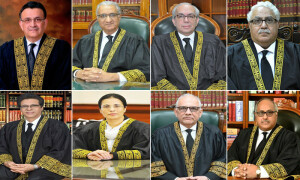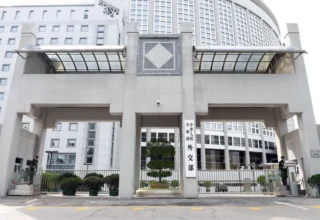
ISLAMABAD: Chief Justice of Pakistan on Wednesday formed an eight-member larger bench of the Supreme Court (SC) to take up three petitions challenging a bill seeking to curtail the powers of the chief justice on Thursday morning.
The bill, titled the Supreme Court (Practice and Procedure) Bill 2023, is aimed at depriving the office of the CJP of powers to take suo motu notice in an individual capacity.
It was initially passed by both houses of parliament and sent to the president for his assent. However, the president had sent it back, saying that the proposed law travelled “beyond the competence of parliament”.
On Monday, the bill was passed by a joint sitting of parliament with certain amendments, amid a noisy protest from PTI lawmakers.
According to the roster issued on Wednesday, the eight-member bench will comprise CJP Umar Ata Bandial, Justice Ijazul Ahsan, Justice Munib Akhtar, Justice Sayyad Mazahar Ali Akbar Naqvi, Justice Muhammad Ali Mazhar, Justice Ayesha Malik, Justice Syed Hasan Azhar Rizvi and Justice Shahid Waheed.
Notably missing from the bench are Justices Qazi Faez Isa and Justice Aminuddin Khan who had earlier ruled that the CJP did not have the power to make special benches or decide its members and ordered the postponement of all suo motu matters. The order was later recalled by a six-member larger bench. Justice Isa, in a judicial note, later said that the bench did not “constitute a constitutional court”.
The cause list issued today showed that three petitions have been filed under Article 184(3) of the Constitution by Advocate Muhammad Shafay Munir, Raja Amer Khan, Chaudhry Ghulam Hussain and others.
Article 184(3) of the Constitution sets out the SC’s original jurisdiction, and enables it to assume jurisdiction in matters involving a question of “public importance” with reference to the “enforcement of any of the fundamental rights” of Pakistan’s citizens.
The petition filed by Advocate Munir insisted that the plea had been filed to safeguard and secure the Constitution and independence of the judiciary.
He contended that the petitioner believed in the supremacy of the Constitution, the rule of law, and independence of the judiciary and had always strived and struggled to protect the Constitution, independence of the judiciary and fundamental rights guaranteed under the Constitution.
The respondents named in the petition included the federal government through the secretaries of law, Senate and National Assembly.













































